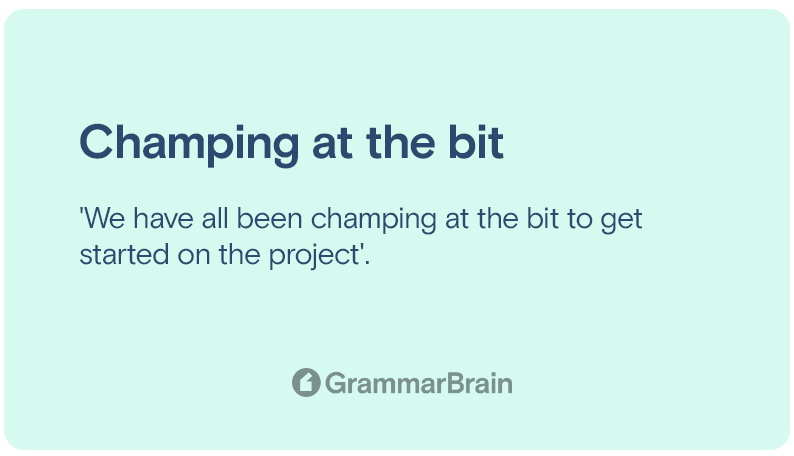What does “champing at the bit” mean? If you are naturally impatient, you may have heard the expression ‘champing on the bit.’ We frequently use this expression without understanding its origins or proper application.
Before we get into the finer details of this expression, it’s worth noting that ‘champing on the bit’ is also spelled ‘chomping on the bit.’ Champ and Chomp are interchangeable words, but champing is the proper use.

What does “champing at the bit” mean?
The phrase “champing at the bit” refers to the behavior of a racehorse before the race as it prepares to start. When someone is “champing at the bit,” it refers to their inability to exhibit restraint, and are restless or impatient. It can also refer to feeling anxious or anticipatory.
Origin of the expression
We split the expression into two halves to better understand its origin.
The word “champing,” which is the first component, comes from an old Middle English term that describes a horse grinding its teeth.
This word is about 600 years old. It is mostly used to describe a horse chewing down on its bridle when restrained. Usually used in the context of horse racing, this emphasizes the restless behavior of a horse before it is set off for the race.
The bit, which is a piece of iron held in a horse’s mouth between its teeth and across its tongue, is the second part. The horse rider uses it to direct and control the animal.
Champing vs. Chomping
To chomp is to chew or bite something.
When we connect the word chomp to the phrase ‘champing on the bit,’ we get the action of the horses chomping or biting the metal (bit) in their strap.
Champing is the correct word to use in the context of this idiom because it has no figurative meaning. As a result, when we use the term champing, it loses its literal meaning of a horse chomping on the bit. Instead, it conveys eagerness or anxiety for something to happen but is restrained from doing it, mostly by circumstances they cannot control.
How to correctly use the expression
This entire phrase is an adjective and can be used both with and without hyphenation. Like any other adjective, it is used to describe a noun.
It can refer to any situation where we are thinking about an upcoming event that makes us restless, impatient, or eager. As for spelling it right, always remember to spell it with an ‘A’ like that of a champion, instead of an ‘O’. [It’s Not “Chomping At The Bit,” It’s “Champing At The Bit” (thecontentauthority.com)
Examples of how to use the expression
- ‘We have all been champing at the bit to get started on the project’. Champing at the bit Definition & Meaning – Merriam-Webster
- ‘I have been champing on the bit to go on this road trip with my friends.’
- ‘Another driver that’s been champing on the bit to get started on the V8 booth.’ Motorsport: Big banger boys ready to rumble – NZ Herald
Inside this article
Fact checked:
Content is rigorously reviewed by a team of qualified and experienced fact checkers. Fact checkers review articles for factual accuracy, relevance, and timeliness. Learn more.
Core lessons
Glossary
- Abstract Noun
- Accusative Case
- Anecdote
- Antonym
- Active Sentence
- Adverb
- Adjective
- Allegory
- Alliteration
- Adjective Clause
- Adjective Phrase
- Ampersand
- Anastrophe
- Adverbial Clause
- Appositive Phrase
- Clause
- Compound Adjective
- Complex Sentence
- Compound Words
- Compound Predicate
- Common Noun
- Comparative Adjective
- Comparative and Superlative
- Compound Noun
- Compound Subject
- Compound Sentence
- Copular Verb
- Collective Noun
- Colloquialism
- Conciseness
- Consonance
- Conditional
- Concrete Noun
- Conjunction
- Conjugation
- Conditional Sentence
- Comma Splice
- Correlative Conjunction
- Coordinating Conjunction
- Coordinate Adjective
- Cumulative Adjective
- Dative Case
- Determiner
- Declarative Sentence
- Declarative Statement
- Direct Object Pronoun
- Direct Object
- Diction
- Diphthong
- Dangling Modifier
- Demonstrative Pronoun
- Demonstrative Adjective
- Direct Characterization
- Definite Article
- Doublespeak
- False Dilemma Fallacy
- Future Perfect Progressive
- Future Simple
- Future Perfect Continuous
- Future Perfect
- First Conditional
- Irregular Adjective
- Irregular Verb
- Imperative Sentence
- Indefinite Article
- Intransitive Verb
- Introductory Phrase
- Indefinite Pronoun
- Indirect Characterization
- Interrogative Sentence
- Intensive Pronoun
- Inanimate Object
- Indefinite Tense
- Infinitive Phrase
- Interjection
- Intensifier
- Infinitive
- Indicative Mood
- Participle
- Parallelism
- Prepositional Phrase
- Past Simple Tense
- Past Continuous Tense
- Past Perfect Tense
- Past Progressive Tense
- Present Simple Tense
- Present Perfect Tense
- Personal Pronoun
- Personification
- Persuasive Writing
- Parallel Structure
- Phrasal Verb
- Predicate Adjective
- Predicate Nominative
- Phonetic Language
- Plural Noun
- Punctuation
- Punctuation Marks
- Preposition
- Preposition of Place
- Parts of Speech
- Possessive Adjective
- Possessive Determiner
- Possessive Case
- Possessive Noun
- Proper Adjective
- Proper Noun
- Present Participle
- Prefix
- Predicate



